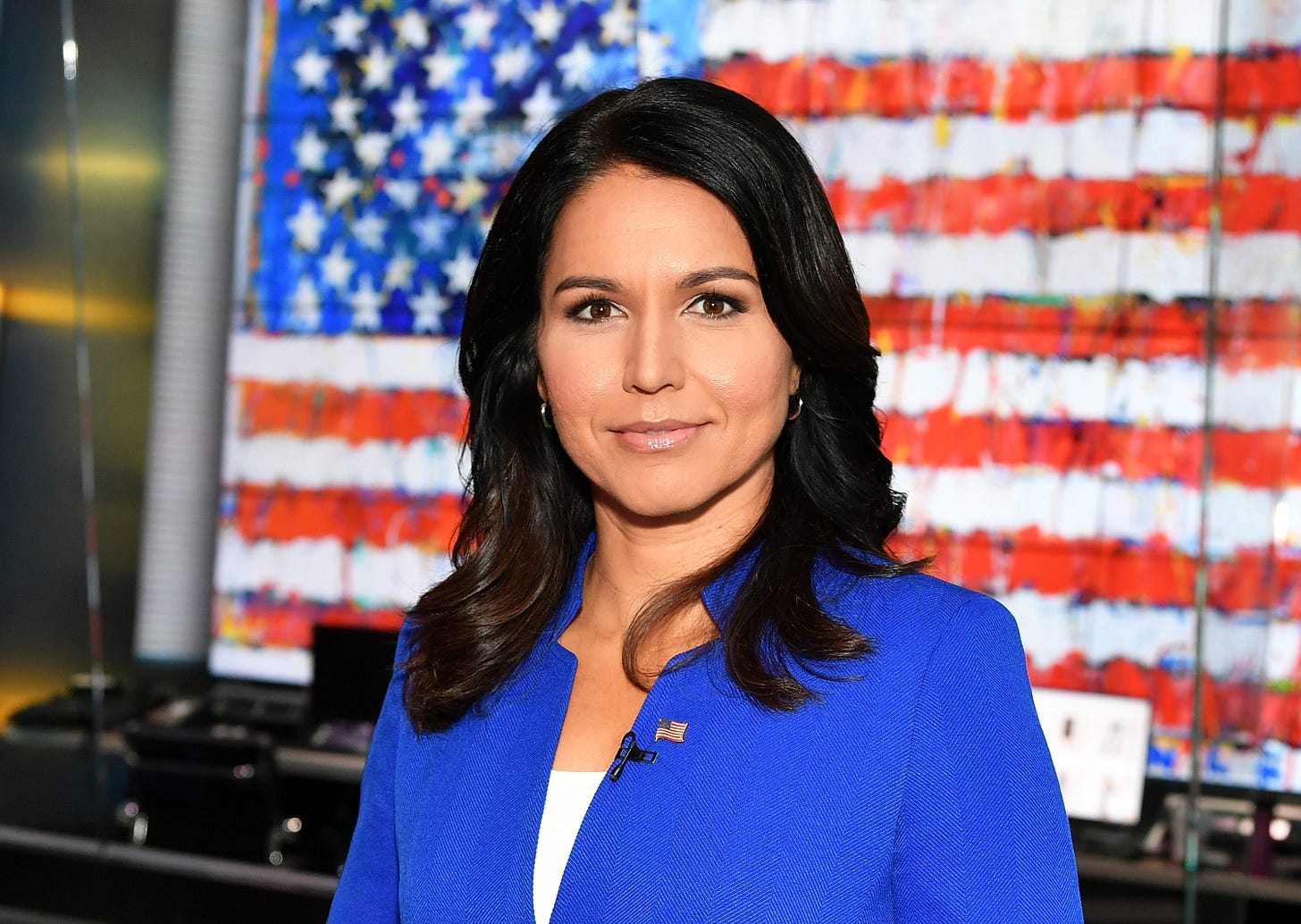This Is Why Hillary Is Attacking Tulsi
There’s no evidence that Tulsi Gabbard has embraced Russia—but there IS evidence that Russia has embraced her.
Hillary Clinton stumbled back into the public spotlight last week by suggesting that Russia is “grooming” Tulsi Gabbard as a third-party candidate in order to help facilitate Donald Trump’s reelection. And that Gabbard, like the Green Party’s 2016 election-spoiler Jill Stein, is a “Russian asset.”
Has Hillary gone off the rails? Or is there something worth watching here?
Yes to both.
Calling a presidential candidate a “Russian asset” is a serious accusation. Unless it is qualified by an adjective like “unwitting,” it comes perilously close to accusing the candidate of treason. Even then, it’s bad. And asserting that the candidate is being “groomed” by the Russians sounds like an accusation of conspiracy.
Add to this the fact that the target of these accusations has some notable firsts on her resume, including being the first Samoan-American and the first Hindu elected to Congress. Gabbard is also a decorated military veteran who served honorably in Iraq and Kuwait, and even now she remains a major in the Hawaii Army National Guard.
So criticism of Clinton for leveling a McCarthyite attack on Gabbard is well deserved. Nothing suggests that Gabbard is in league with Russia. She should not be left with the impossible task of proving a negative.
But the picture is not nearly as clear on the Russian side of the equation.
Although there’s no evidence that Gabbard has embraced Russia, there is evidence that Russia has embraced Gabbard.
According to the New York Times, an independent analysis of the Russian news media found that RT, the Kremlin-backed news agency, features Gabbard far more than a candidate with her low polling numbers could expect. And “disinformation experts have also pointed to instances of suspicious activity surrounding Ms. Gabbard’s campaign.”
Reports that the Russian propaganda machine has been promoting Gabbard’s presidential aspirations aren’t new. They have been circulating at least since early this year. A February 2 NBC News article reported that Gabbard had become a favorite of the same English-language news sites employed by Russia to interfere with the 2016 election:
All three [Russian-controlled] sites [RT, Sputnik News, and Russia Insider] celebrated Gabbard’s announcement, defended her positions on Russia and her 2017 meeting with Syrian President Bashar Al-Assad, and attacked those who have suggested she is a pawn for Moscow. The coverage devoted to Gabbard, both in news and commentary, exceeds that afforded to any of the declared or rumored Democratic candidates despite Gabbard’s lack of voter recognition.
Why would Russia embrace and promote Gabbard’s candidacy? She’s an exceedingly remote longshot whose polling numbers hover between 1 and 2 percent.
Set aside for a moment the fact that Donald Trump was also an extreme longshot at the beginning of the 2016 race. Gabbard, lacking Trump’s celebrity and name recognition, is a much longer shot than Trump was. If you’re interested, you could probably put $100 on Gabbard being elected at odds of about 7,000 to 1.
But Gabbard—or any candidate with even a modicum of name recognition—could still have a major impact on the 2020 election by running as a third-party candidate.
A third-party candidate could suck away enough votes from the Democratic nominee to swing the election to Trump. The margin of victory is likely to be paper-thin in a handful of key states, and it wouldn’t take much to push the result one way or another. Just ask Jill Stein.
But still, why Gabbard? Why not Beto O’Rourke, Amy Klobuchar, Andrew Yang, or any of the other candidates who will be forced to pull out of the race sooner or later?
Because Gabbard is just, well, different.
She’s an unpredictable wild card who has carved out a unique position in the race for the Democratic nomination. She has adopted some distinctly Trumpian postures, including accusations that the corporate news media and the Democratic National Committee, two frequent Trump targets, are conspiring to rig the debates, which she has threatened to boycott.
She is, in a word, a maverick.
And she enjoys support (real or pretend) from unexpected sources. All of which leads to headlines like this in the Times: “What, Exactly, Is Tulsi Gabbard Up To?”
And strange bedfellows:
Perhaps strangest of all is the unusual array of Americans who cannot seem to get enough of her. On podcasts and online videos, in interviews and Twitter feeds, alt-right internet stars, white nationalists, libertarian activists and some of the biggest boosters of Mr. Trump heap praise on Ms. Gabbard. They like the Hawaiian congresswoman’s isolationist foreign policy views. They like her support for drug decriminalization. They like what she sees as censorship by big technology platforms.
All of this gives some credence to the idea that Gabbard is the most likely of the Democratic candidates to launch a third-party run, especially if she continues to believe that she has been treated unfairly by the Democratic party. She has just the right mix of victimhood and stubbornness to damn the torpedoes. And just enough policy differences from the other candidates to appeal to a slice of disaffected voters. And she has nothing to lose.
Think of it this way. If somebody told you that one of the Democratic candidates is actually a Martian, whom would you think of first?
So let’s condemn Hillary for a baseless attack on Gabbard’s unquestioned patriotism.
But, at the same time, let’s keep an eye on Tulsi Gabbard.



